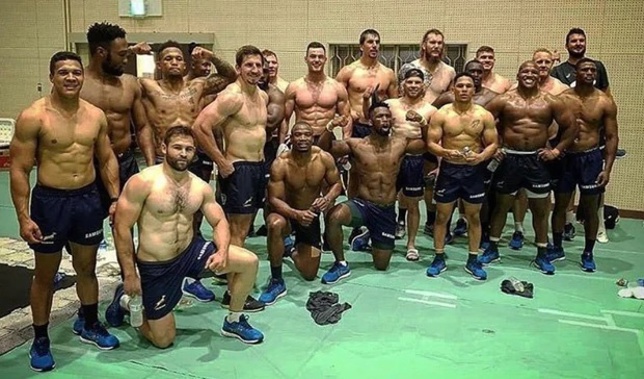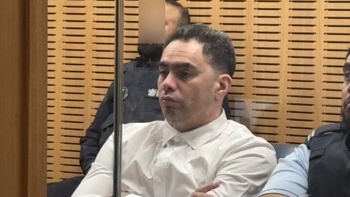
An Irish sports writer is claiming South Africa's World Cup victory is tainted by performance-enhancing drug use.
While not pointing a finger directly at any particular player in the Springboks World Cup squad, Neil Francis of the Irish Independent says the sporting world can be "fairly certain" that there is a "steroid culture in a country that has just won the World Cup".
Francis, a former Ireland World Cup forward, writes that the circumstances surrounding the pre-tournament positive test returned by young Springbok outside back Aphiwe Dyantyi points to a far bigger problem.
He has called on World Rugby to use Dyantyi's case to investigate South African rugby further, but also suggests World Rugby is happier turning a blind eye to any problem there.
Dyantyi was tested at a Springbok training camp in early July. It was initially reported that he had a hamstring problem, but in late August it was revealed he had returned a positive test for a banned substance.
Dyantyi, who missed the World Cup and could be banned for four years, protested his innocence saying he had never cheated and "taking any prohibited substance would not only be irresponsible and something that I would never intentionally do, it would also be senseless and stupid."
But Francis argues that the test results paint a very different picture.
"Dyantyi's statement was released immediately after his A sample results became public. It was a robust riposte," Francis writes.
"When the B sample results became known it was a bombshell - not one but three prohibited substances: Methandienone, Methyltestosterone and Ligandrol or LGD 4033.
"In my opinion that's game, set and match. It is not the cocktail of drugs that will do him, it is how the cocktail works in conjunction with each other that is so damning.
"Methandienone, or its trade name Dianabol, was first formulated in the early 1960s and has been improved on over the decades but you will find it still regularly pops up on WADA's adverse findings list.
"Ligandrol, though, has only been on the market for several years and is the gold standard of anabolic steroids. It is known as a SARM - selective androgen receptor modulator. It goes directly to the muscle groupings required. It is an extremely efficient steroid. It is taken orally and you can pack on six to eight pounds of lean muscle in an eight-week cycle."
/arc-anglerfish-syd-prod-nzme.s3.amazonaws.com/public/KMJEJSOZSFEY5OW66J3QMR5Q6A.jpg)
The Springboks celebrating with the Webb Ellis Cup. Photo / Mark Mitchell
Francis then concludes: "Maybe I have underestimated the intellectual capacity of young men in the early to mid-20s but how many of them have the capacity to self-administer on a sophisticated programme of androgynous anabolic steroids?
"I would be very surprised if Dyantyi did not have someone instruct him what to do and how and when to do it. Do these people have any affiliations or are they just like the tooth fairy, magically appearing out of thin air to give athletes steroids which are very difficult to source and then instruct them professionally on how the cycle should be done?"
The writer has called on world rugby bosses to offer Dyanti a plea bargain in return for information about how he got the drugs and administered them.
"Banning Dyantyi for four years solves nothing. It is the people behind the player you have to nab. Maybe World Rugby would be happier not to find out that this is the case," he writes.
Francis cites two other cases. Unathi Mali, a South African women's sevens player, was caught in 2018, claimed methandienone was in her drinking water. Springbok forward Chilliboy Ralepele was suspended twice for prohibited substances but finished out his playing career.
(While Francis did not use these cases, four other former Springboks failed drugs tests during their careers).
Francis also points to evidence of young players using steroids.
"In a recent state-sponsored survey conducted by the South African Institute for Drug Free Sport, a poll of 12,000 high school boys showed that 10 per cent of them took anabolic steroids. The poll was conducted in the Kwa Zulu-Natal region of the country.
"Why would high school boys admit to taking steroids if they had not taken them in the first place? It's only a sample but 1,200 boys, some as young as 13? Where did these children get this stuff? How could their parents not know? How could the schools and the unions not know?
"How certain are we when we point a finger to suggest there is a steroid culture in a country that has just won the World Cup? Fairly certain.
"Is Dyantyi, a poster boy for the World Cup and winner of World Rugby's young player of the year, the only one? Or the only one to be caught?
"The player in my view will go down but the system stays in place. What were we saying about latitude and dispensation? Do we need to put an asterisk beside the winners of the 2019 World Cup?"
The Springboks sent fans on social media into meltdown shortly before the start of the Rugby World Cup, with a team picture showing off their chiselled upper bodies.
The Boks beat England 32-12 in the final to claim a third Webb Ellis trophy.
Take your Radio, Podcasts and Music with you









